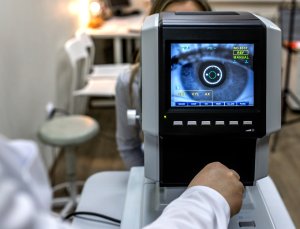What to Expect Before, During & After Cataract Surgery

Voted Best of Berks—
eight years in a row!
Cataract surgery is a common and generally safe procedure that can significantly improve vision for people with cataracts. Understanding what to expect before, during, and after the surgery can help alleviate anxiety and ensure a smoother experience. Eye Consultants of Pennsylvania is happy to share our tips for a successful cataract surgery.
Before Surgery
- Consultation: Before scheduling the surgery, you will have a comprehensive eye examination with an ophthalmologist. They will evaluate the severity of your cataracts, assess your overall eye health, and discuss your medical history.
- Pre-operative Evaluation: You may undergo additional tests, such as eye shape and size measurements, to determine the appropriate intraocular lens (IOL) for implantation during surgery.
- Medication Adjustments: Your doctor may advise you to adjust or discontinue certain medications, particularly blood thinners, to reduce the risk of bleeding during surgery.
- Preparing for Anesthesia: Cataract surgery is usually performed under local anesthesia, meaning you will be awake, but your eye will be numbed. However, your doctor may also provide medication to help you relax.
During Surgery
- Anesthesia: You will be positioned comfortably, and your eye will be numbed with eye drops or a local anesthetic injection. You may also receive a sedative to help you relax.
- Incision: The surgeon will make a small incision in the eye to access the clouded lens.
- Phacoemulsification: Using a specialized tool called a phacoemulsifier, the surgeon will break up the cloudy lens into small pieces and gently suction them out.
- Lens Implantation: Once the cataract is removed, an artificial lens called an intraocular lens (IOL) will be inserted into the eye to replace the natural lens. The IOL will help focus light onto the retina, restoring clear vision.
- Closing Incision: The incision is usually self-sealing and may not require stitches. A protective shield may sometimes be placed over the eye for added protection.
After Surgery
- Recovery Room: You will spend time in a recovery area where your vital signs will be monitored. You will be allowed to go home once you are fully awake and stable.
- Post-operative Care: Your doctor will provide detailed instructions on how to care for your eye following surgery, including using prescription eye drops to prevent infection and reduce inflammation.
- Rest and Recovery: It’s essential to rest and avoid strenuous activities in the days following surgery to allow your eye to heal correctly.
- Follow-up Appointments: You must attend follow-up appointments with your doctor to monitor your progress and ensure your eye is healing correctly. Your doctor may also prescribe glasses or contact lenses to optimize your vision.
- Vision Improvement: While some people experience improved vision almost immediately after surgery, it’s normal for vision to be blurry or distorted initially. Your vision will continue to improve over the following days and weeks as your eye heals and adjusts to the new lens.
- Possible Complications: Although cataract surgery is considered safe, complications such as infection, swelling, or retinal detachment can occur. Contact your doctor immediately if you experience severe pain, sudden vision changes, or any other concerning symptoms.
By understanding the process and knowing what to expect before, during, and after cataract surgery, you can approach it with knowledge, leading to more confidence and less anxiety. If you need cataract surgery or even suspect you have a cataract, Eye Consultants of Pennsylvania is ready to see you. We will answer all your questions so you are comfortable with this procedure. Give us a call today, and come see us soon.
Find a Doctor
Physician information including education, training, practice location and more.
Schedule an Appointment
Call 800-762-7132 or make an appointment online.





